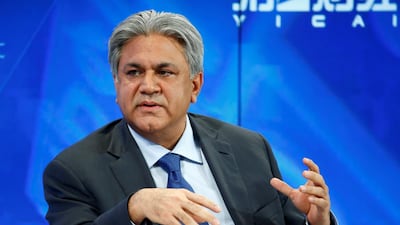Two former executives of The Abraaj Group, which collapsed last year in the world's biggest private-equity insolvency, were arrested on US charges of defrauding investors, with one defendant held after arriving in New York with his wife and son to look at colleges.
Arif Naqvi, the founder and ex-chief executive officer, was arrested in London in the last week and is awaiting possible extradition to the US. Mustafa Abdel-Wadood, a former managing partner, was arrested on Thursday in New York and remains in a federal lock-up.
“The government moved forward because this defendant was present in the US this week unexpectedly,” Assistant US Attorney Andrea Griswold said in a hearing in Manhattan.
Mr Abdel-Wadood pleaded not guilty and is due back in court on April 18. A graduate of the American University in Cairo, with a master’s degree from Georgetown University in Washington, Mr Abdel-Wadood was arrested at his hotel while in New York to look for colleges for his son.
His lawyer Benjamin Brafman declined to comment after the court hearing. A lawyer for Mr Naqvi in Dubai didn’t immediately return an email seeking comment on the charges.
Founded in 2002, Abraaj grew to become the Middle East’s biggest private equity fund and one of the world’s most influential emerging-market investors, with stakes in health care, clean energy, lending and real estate across Africa, Asia, Latin America and Turkey. But last year Mr Naqvi surrendered control after it was revealed that the firm’s main revenues hadn’t covered operating costs for years.
Abraaj, which managed almost $14 billion (Dh51.4bn), was forced into liquidation in June after a group of investors, including the Bill & Melinda Gates Foundation, commissioned an audit to investigate the alleged mismanagement of money in its healthcare fund.
Mr Naqvi and Mr Abdel-Wadood are charged with inflating the value of the firm’s holdings and stealing hundreds of millions of dollars. Prosecutors say that from 2014 to 2018 they and others not identified in the court papers worked to artificially inflate the value of Abraaj’s emerging-market investments by more than $500 million. The firm used money earmarked for investments to meet its own operating expenses without telling investors, prosecutors said.
Mr Naqvi is also charged with stealing investors’ money for himself and his inner circle, including Mr Abdel-Wadood, a resident of Dubai. The two are accused of conspiracy, wire fraud and securities fraud.
In court on Thursday, Ms Griswold said the evidence against Mr Abdel-Wadood included secretly recorded calls and meetings, encrypted messages and millions of documents and computer files. Ms Griswold said the US had planted a geolocation tracker on Mr Abdel-Wadood’s phone. Mr Abdel-Wadood, dressed in a sports jacket, black shirt and jeans, didn’t speak during the proceeding.
Mr Abdel-Wadood’s surprise apprehension was reminiscent of the 2016 arrest of Turkish-Iranian gold trader Reza Zarrab, who was taken into US custody while on a family trip to Disney World in Florida. After being held in jail for more than a year, Mr Zarrab agreed to co-operate with prosecutors and testified against a Turkish banker who was convicted last year of helping Iran evade US financial sanctions.
Mr Naqvi was charged in the UAE in a $217m bounced-check case, which was settled after the court sentenced him to three years in prison. Mr Naqvi was out of the country at the time.

